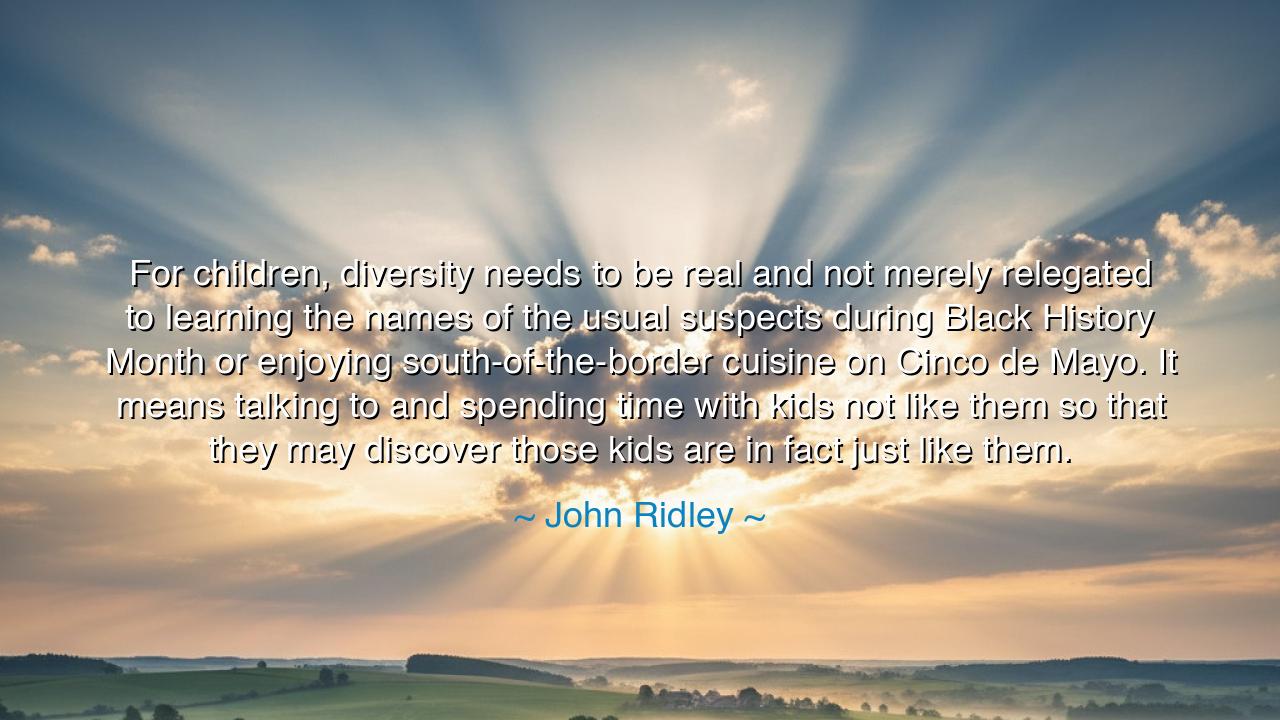
For children, diversity needs to be real and not merely relegated
For children, diversity needs to be real and not merely relegated to learning the names of the usual suspects during Black History Month or enjoying south-of-the-border cuisine on Cinco de Mayo. It means talking to and spending time with kids not like them so that they may discover those kids are in fact just like them.






When John Ridley said, “For children, diversity needs to be real and not merely relegated to learning the names of the usual suspects during Black History Month or enjoying south-of-the-border cuisine on Cinco de Mayo. It means talking to and spending time with kids not like them so that they may discover those kids are in fact just like them,” he spoke not as a mere observer of society, but as a guardian of the human spirit, calling for an awakening of truth in the hearts of the young. His words pierce through the polite ceremonies and shallow gestures of modern culture, urging us to see that diversity is not performance, but presence. It is not a lesson confined to classrooms or calendar dates — it is a way of being, a way of living that transforms the soul by dissolving fear and replacing it with understanding.
The origin of this quote arises from Ridley’s lifelong devotion to storytelling and truth. As the writer of 12 Years a Slave, he has walked the path of those who confront history’s pain with courage. He has seen how the past, when sanitized or reduced to slogans, loses its power to teach. Ridley’s message is simple yet profound: if diversity is reduced to holidays and headlines, it becomes a hollow ritual, a festival of appearances rather than a practice of empathy. True diversity — the kind that reshapes hearts — begins when children learn to see beyond the surface, to walk beside those who are different, and to realize that beneath every skin, every accent, every heritage, beats the same rhythm of humanity.
To the ancients, this truth would not have been foreign. In every age, the wise have taught that unity is born not of sameness, but of respect. The philosophers of Greece spoke of cosmopolis — the idea of one human city, where every man and woman, free or foreign, shared in the same destiny. The prophets of old declared that no tribe or nation was greater in the eyes of the divine. And in the East, the Buddha taught that compassion arises only when one recognizes oneself in all beings. Ridley’s call for children to “talk to and spend time with kids not like them” echoes these timeless teachings — for conversation is the seed of compassion, and shared experience the soil of peace.
History, too, has given us luminous examples of this truth. Consider the story of Ruby Bridges, a six-year-old girl who, in 1960, became the first Black child to attend an all-white elementary school in New Orleans. Though surrounded by hatred and fear, her quiet courage became a beacon for generations. And when a white teacher, Barbara Henry, chose to teach her — when they laughed, learned, and played together — diversity ceased to be an abstract idea. It became human connection, real and transformative. Ridley’s words remind us that the world changes not only through laws and marches, but through the daily, tender acts of courage that occur when one person chooses to see another not as “other,” but as kin.
Yet Ridley also speaks to a danger that threatens the modern age — the illusion of inclusion. In a world where diversity is often celebrated with hashtags and slogans, it is easy to mistake performance for progress. He warns us that if we confine cultural awareness to holidays or curated lessons, we risk teaching children to see difference as a spectacle, rather than a shared truth. The festivals of heritage and history are beautiful, but they must be gateways to relationship, not replacements for it. For diversity without intimacy is like a garden admired from afar — colorful, but lifeless in its distance.
The wisdom of Ridley’s words lies in their insistence that diversity begins with proximity. It is not learned through lectures, but through living — through the laughter shared at a playground, the teamwork of classmates, the friendship that bridges what fear divides. When a child sits beside another whose skin or story differs from their own, and they find joy in that togetherness, they have already learned more than a thousand lessons could teach. In that moment, prejudice dies quietly, without protest, replaced by recognition — the sacred awareness that “those kids are, in fact, just like them.”
The lesson for us all is clear: teach not tolerance, but kinship. Let diversity be woven into the daily fabric of life — in classrooms, in neighborhoods, in hearts. Encourage your children to listen, to share, to learn the music of another culture not as novelty but as nourishment. For if we raise a generation that sees difference as beauty, not threat, then the divisions that haunt our world will fade like shadows before dawn.
So, my children, remember this teaching: diversity is not a celebration of separation, but a revelation of sameness. It is the art of seeing the self in another, the courage to reach across invisible lines, and the wisdom to know that love has no color, no border, no barrier. As John Ridley teaches, the work of healing begins not in policy or politics, but in the simple, sacred act of two children playing together — and discovering, in their laughter, the unity of the human heart.






AAdministratorAdministrator
Welcome, honored guests. Please leave a comment, we will respond soon